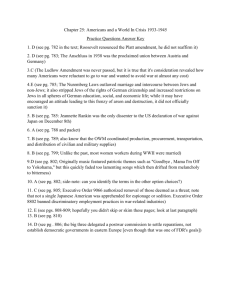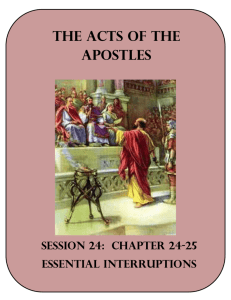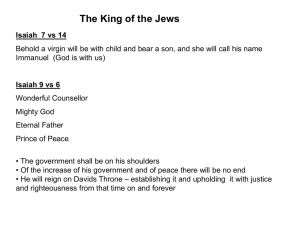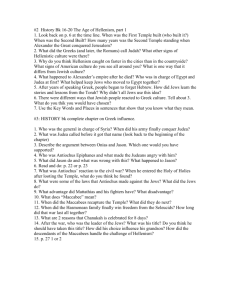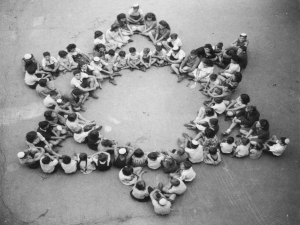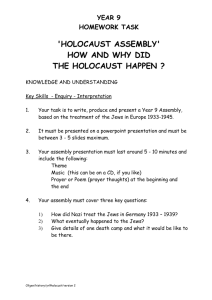3. Procurators - Bible Teaching Program
advertisement
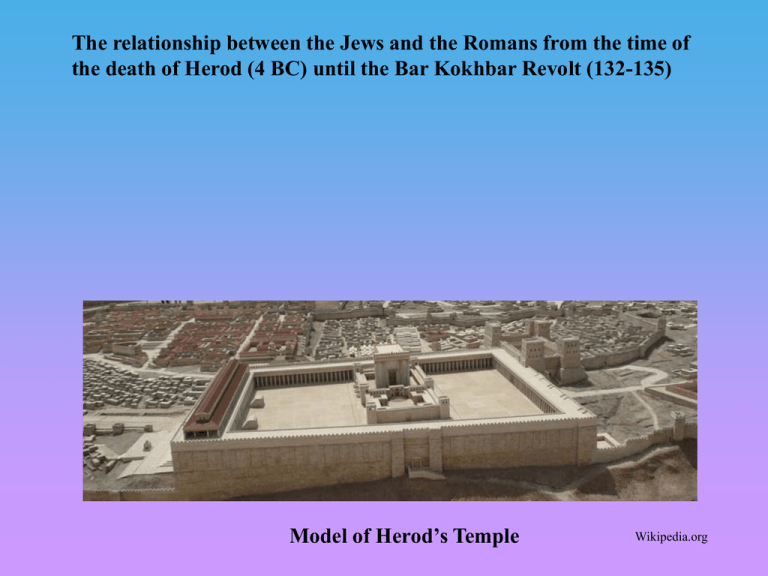
The relationship between the Jews and the Romans from the time of the death of Herod (4 BC) until the Bar Kokhbar Revolt (132-135) Model of Herod’s Temple Wikipedia.org Herod’s Kingdom divided between his 3 sons (4 BC) Archelaus ethnarch of Judea Antipas and Philip ruled as tetrarchs (a fourth part of the kingdom) Herod Antipas tetrarch of Galilee Herod Philip tetrarch of the north- eastern province. He reigned 37 years – died 20th year of Tiberius (AD 34) Judea becomes a Roman Province (AD 6) After complaints from Jews and Samaritans, Archelaus was banished by Rome to Vienna in AD 6 AND Judea became a Roman province. Then Judea was governed by a procurator, Coponius, but came under the supervision of the legate of Syria, Quirinius. Census made in AD 6 providing details of population and resources for the purpose of taxing the Jews. Formation of Zealots Taxation by Rome led to formation of Zealots led by Judas of Galilee. Judas was killed but he is mentioned in Acts 5:37. Kings of Israel – During the time of the New Teatament Herod the Great (37 BC – 4 BC) Archeleaus (4 BC – 6 AD) – Ethnarch of Judea Antipas (4 BC – 39 AD) - Tetrarch Philip (4 BC – 34 AD) - Tetrarch Herod Agrippa I (37 – 44) – Friend of Claudius. King of all Israel Died in Caesarea (Acts 12:23) | ————————————————————————— | Agrippa II | Bernice his sister (Acts 25:23) | Drusilla m Felix Roman Procurators (6 AD – 66 AD) Coponius (6 – 9) Marcus Ambivulus (9 – 12) Annius Rufus (12 – 15) Valerius Gratus (15 – 26) Pontius Pilate (16 – 36) Marcellus (36 – 37) Marullus (37 – 41) Cuspius Fadus (44 – 46) Tiberius Julius Alexander (46 – 48) (nephew of Philo of Alexandria) Ventidius Cumanus (48 – 52) Roman Procurators (6 AD – 66 AD) Antonius Felix (52 – 58) Felix governed Judea harshly. He was licentious. Felix and Drusilla (Acts 24:24) Drusilla Daughter of Herod Agrippa (Acts 12:1) Sister of Agrippa II (Acts 25:23) Married to Azizus king of the Emesenes, but she was enticed away from her husband by Felix. Felix used the Sicarii to murder the High Priest, Jonathan. The Zealots Guerilla tactics The Sicarii Name came from the guerilla tactic of using a small curved knife, called a sica under their clothes. They would stab their victim in the midst of a large crowd. The hidden dagger and the large crowd made it impossible to know who had committed the murder. When the assassin had killed his victim he then mingled among the crowd shouting condemnations against the attacker. He then escaped undetected. The Sicarii were able to commit murder in broad daylight. They were also known to murder their victim in the Temple. Roman Procurators (6 AD – 66 AD) Porcius Festus (58 – 62) Inherited problems from the harsh way Felix governed. Problem issues 1. Concerned the civic privileges of the Jews. 2. The dispute between Agrippa II and the Jews concerning the building of a Temple wall in Jerusalem. The Martyrdom of James the Lord’s brother. When Festus died in AD 62 the High Priest Ananus convened the Sanhedrin and ordered the death of James, the Lord’s brother. He was stoned to death. Flavius Josephus (c.37-100) Wrote the account of how James was stoned to death in Jerusalem (AD c.62) Ananus assembled the sanhedrim of judges, and brought before them the brother of Jesus, who was called Christ, whose name was James, and some others, [or, some of his companions] Book 20 Chapter 9:1. Albinus (62 – 64) Albinus was in Alexandria when Nero ordered him to be prcurator. He sent an order condemning Ananus for calling the Sanhedrin without his permission. Agrippa II removed Ananus from the office of High Priest before Albinus arrived in Jerusalem. Albinus sought to remove the Sicarii. He was replaced by Gessius Florus (64 –66) Gessius Florus (64 –66) The harsh actions of Florus towards the Jews were the trigger that began the revolt of the Jews. Jews in Caesarea wanted to buy land adjoining their synagogue. The owner would not sell. The Gentile owner began to buld on the land. The Jews paid Florus 8 talents to ensure the building work stopped. He took the money but allowed the building to continue. The Gentiles mocked the Jews by sacrificing a bird next to the synagogue. Jews rioted. Florus then sent men to take 17 talents from the temple treasury. The Jews protested on the streets calling on Caesar to free them from the tyranny of Florus. Others mocked Florus by begging on the streets of Jerusalem for the needy procurator. Florus reacted by marching his army into Jerusalem to kill and pillage. Josephus claims 3600 were put to death. At this time Agrippa II returned to Jerusalem from Alexandria. Josephus has written a speech that he claimed was given by Agrippa to the Jews at this time. Josephus The speech of Agrippa II (War of the Jews Book 2, Chapter 16, para. 4) It is unlikely that Agrippa made this speech. It is more likely that it is the composition of Josephus and not a historical record Josephus. He rejects the expectation of divine deliverance. Jews kept the Sabbath when Pompey lay siege. Keeping the Sabbath helped the Romans to be victorious. Futile to rebel because the first duty of the priesthood was to uphold the Law. Obeying the law made it impossible to defeat the Romans Breaking the law was to deny the faith they were fighting to uphold.
